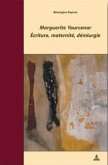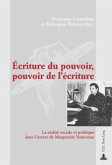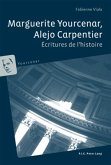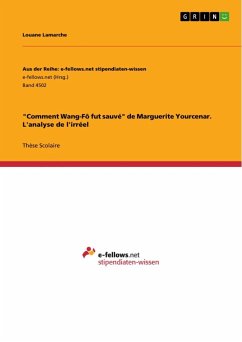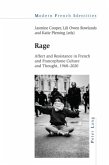Although Marguerite Yourcenar (1903-1987) lived in the US for almost fifty years and became an American citizen in 1947, few people understand the influence her experiences in the United States had on her work. Biographers, critics and scholars have wrongly imagined she was untouched by her life in America - that she remained French to the core, linguistically isolated, culturally «pure», that she never took an interest in the country where she lived for half her life.
Drawing on Yourcenar's fiction and non-fiction works as well as on her voluminous archives at Harvard's Houghton Library, this innovative analysis sheds new light on Yourcenar's American inspirations and influences. A previously unreleased interview of Marguerite Yourcenar by the American journalist T. D. Allman, a letter from Marguerite Yourcenar written in English, an amazing photograph from Life magazine, and entries from her companion Grace Frick's diaries are among the documents, mostly previously unpublished, which bring to life the American side of Yourcenar's literature. This study also reveals that Marguerite Yourcenar, far from being limited to French, had an outstanding mastery of the English language. It shows how, thanks to her understanding of America and its language, she became an authentic heir to a long and vivid American tradition: protest literature.
Drawing on Yourcenar's fiction and non-fiction works as well as on her voluminous archives at Harvard's Houghton Library, this innovative analysis sheds new light on Yourcenar's American inspirations and influences. A previously unreleased interview of Marguerite Yourcenar by the American journalist T. D. Allman, a letter from Marguerite Yourcenar written in English, an amazing photograph from Life magazine, and entries from her companion Grace Frick's diaries are among the documents, mostly previously unpublished, which bring to life the American side of Yourcenar's literature. This study also reveals that Marguerite Yourcenar, far from being limited to French, had an outstanding mastery of the English language. It shows how, thanks to her understanding of America and its language, she became an authentic heir to a long and vivid American tradition: protest literature.
«This is a very welcome contribution to the debate on the real effect of the United States on Yourcenar's life and thought, a good read on a fascinating subject which critics have often treated dismissively. Future scholarship will be obliged to weigh Bérengère Deprez's arguments and evidence seriously, and thank her for her clearheaded thoroughness.» (Prof. Brian Gill, University of Calgary, Canada)
«Die Verfasserin (...) führt unmissverständlich den bislang verkannten literarischen 'Gewinn' vor Augen, den die Autorin aus ihrer Beziehung zu den Vereinigten Staaten zu ziehen wusste. Deprez schliesst mit dieser unprätentiösen, aber um nichts weniger profunden Monografie eine Lücke in der Forschung.» (Walter Wagner, Sprachkunst)
«Die Verfasserin (...) führt unmissverständlich den bislang verkannten literarischen 'Gewinn' vor Augen, den die Autorin aus ihrer Beziehung zu den Vereinigten Staaten zu ziehen wusste. Deprez schliesst mit dieser unprätentiösen, aber um nichts weniger profunden Monografie eine Lücke in der Forschung.» (Walter Wagner, Sprachkunst)


